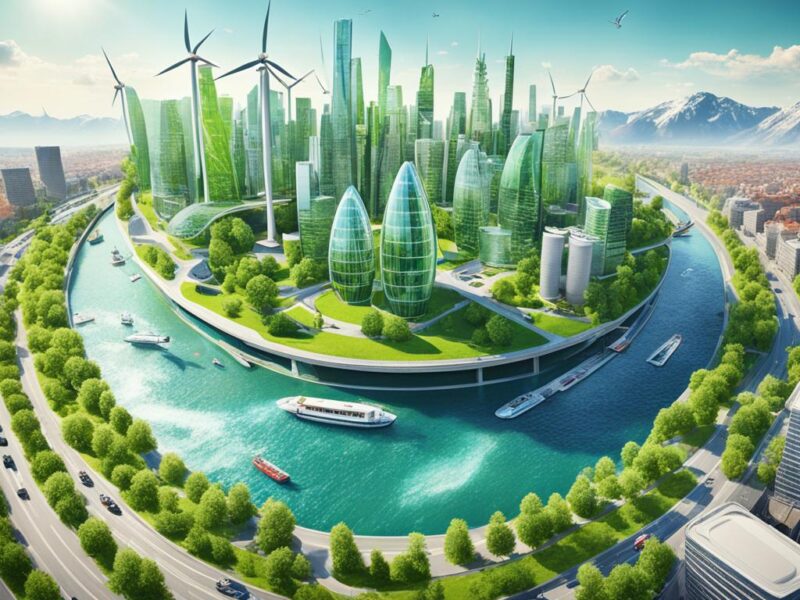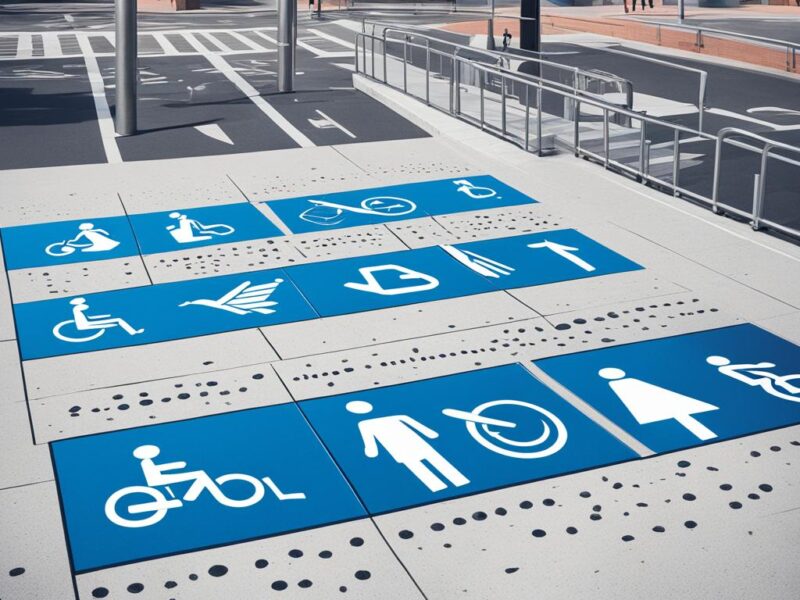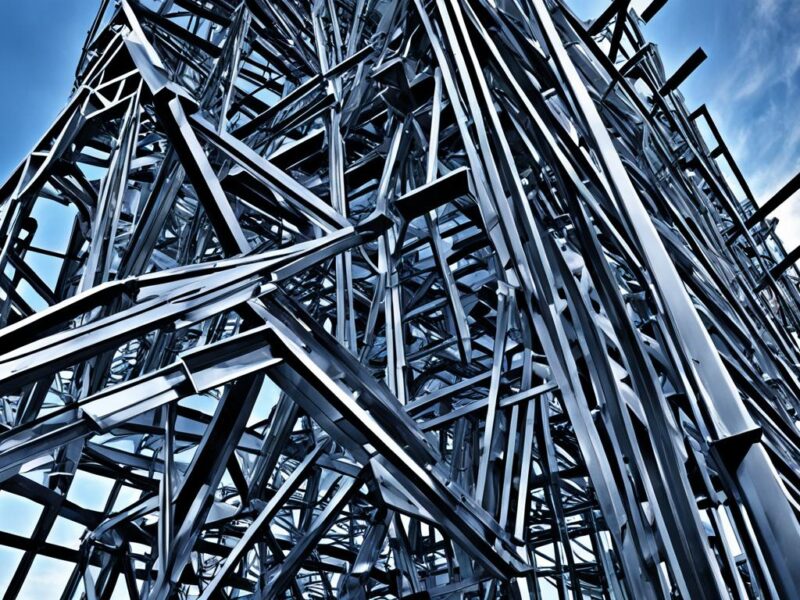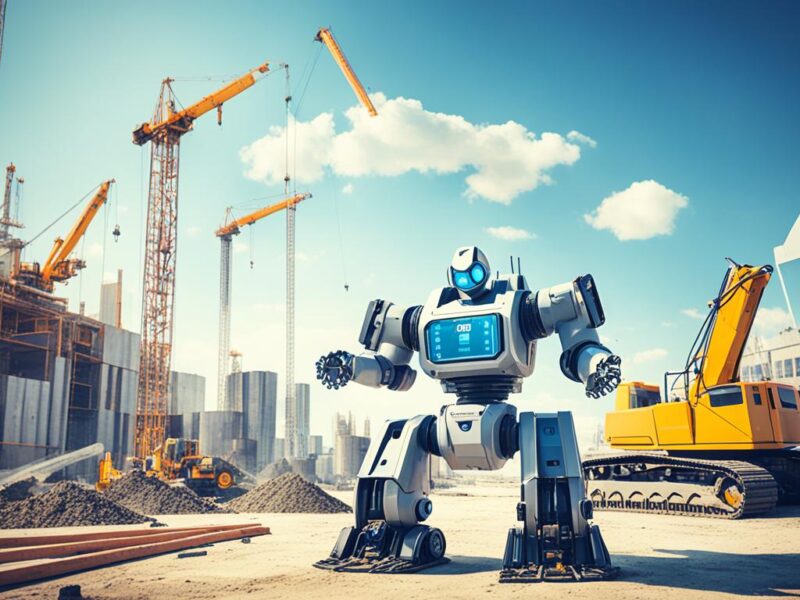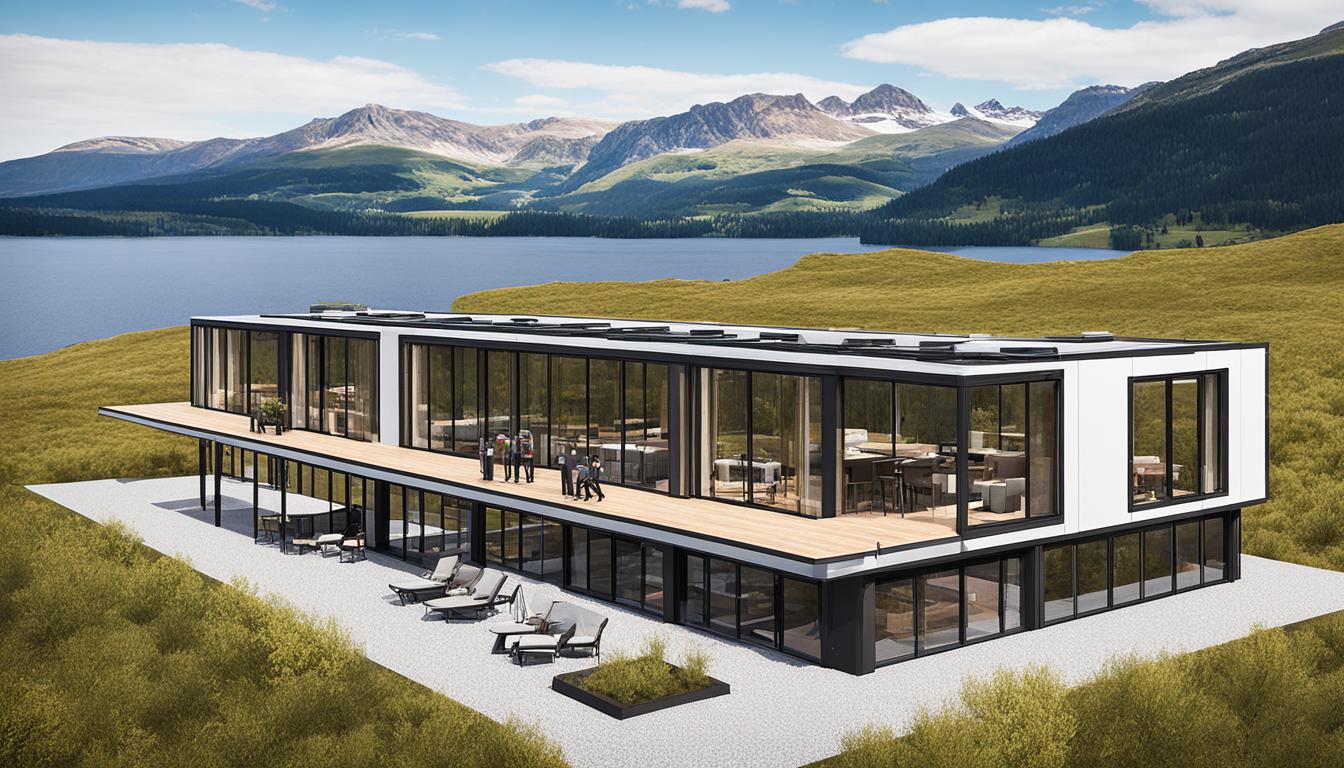
The Future of Modular Construction in the Hospitality Industry
The hospitality industry, encompassing hotels, tourism, accommodations, and hospitality management, is undergoing a significant transformation with the emergence of modular construction. This innovative approach is revolutionizing the way hotels and other hospitality establishments are built, offering numerous benefits in terms of cost, schedule, quality, and safety performance. As the demand for faster, more efficient construction methods grows, modular construction is poised to reshape the future of the hospitality industry.
Key Takeaways:
- Modular construction is revolutionizing the hospitality industry, offering improvements in cost, schedule, quality, and safety performance.
- McKinsey and Company projects that modular construction could claim $130 billion of the market by 2030 in the United States and Europe, delivering significant cost savings.
- The Hill Group highlights benefits such as higher quality materials, increased safety, and waste reduction in modular construction.
- Modular construction offers advantages such as speed, efficiency, cost savings, quality control, scalability, and sustainability for the hospitality industry.
- Tomu Inc., a sustainability-focused development startup, offers customizable modular hotel units, providing affordable and sustainable accommodations.
Advantages of Modular Construction in the Hospitality Industry
Modular construction offers several advantages for the hospitality industry. The speed, efficiency, cost savings, quality control, scalability, and sustainability of this construction method make it an attractive choice for hoteliers looking to enhance their operations.
Reduced Construction Time
One of the primary benefits of modular construction is its ability to significantly reduce construction time. By utilizing pre-fabricated modules that are manufactured off-site, hoteliers can expedite the construction process and open their establishments sooner. This enables them to capitalize on peak booking periods and start generating revenue faster.
Cost Savings and Efficiency
Modular construction also delivers cost savings and operational efficiency. The controlled factory environment ensures predictable budgeting, as manufacturing costs can be accurately estimated. Additionally, the streamlined production process minimizes waste and maximizes efficiency. By eliminating weather-related delays and optimizing the use of materials, hoteliers can achieve significant cost savings.
Consistent Quality Control
Quality control is a crucial factor in the hospitality industry, and modular construction provides a solution by ensuring consistent quality. The modules are constructed in a controlled factory environment, allowing for rigorous inspections and adherence to industry standards. This eliminates the risk of inconsistencies, defects, or delays that might occur in traditional on-site construction.
Flexibility and Scalability
Modular construction offers flexibility and scalability, allowing hoteliers to customize their properties based on specific requirements and easily expand when needed. As the demand for accommodations fluctuates, modular construction allows for seamless adjustments in capacity. This adaptability enables hoteliers to cater to changing market conditions and guest preferences with ease.
Sustainability
Sustainability is becoming increasingly important in the hospitality industry. Modular construction offers a sustainable option, as it produces less waste and offers energy-efficient designs. By maximizing the use of materials and optimizing resource efficiency, modular construction minimizes the environmental impact associated with traditional construction methods.
Overall, modular construction provides a range of advantages for the hospitality industry, from time and cost savings to quality control and sustainability. Hoteliers who embrace this innovative approach to construction can enhance their operations, deliver exceptional guest experiences, and position themselves for long-term success.
Case Study: Tomu Inc. and Modular Hotel Units
Tomu Inc., a sustainability-focused development startup, is revolutionizing the hospitality industry with its innovative approach to modular hotel units. These modular units provide sustainable accommodations that are not only environmentally friendly but also affordable and customizable.
Tomu’s dedication to sustainability is evident in the design and construction of their modular hotel units. By utilizing a controlled factory environment, the company reduces waste and ensures efficient use of materials. This focus on sustainability is especially relevant as the hospitality industry aims to reduce its carbon footprint and cater to eco-conscious travelers.
The customization options offered by Tomu’s modular system allow hoteliers to create unique and personalized accommodations that meet the specific needs of their target audience. From ready-to-stay options suitable for budget-conscious travelers to fully bespoke designs for luxury establishments, Tomu’s modular units offer a range of configurations to cater to diverse customer segments.
Underserved travelers, who often struggle to find accommodations that meet their unique requirements, benefit greatly from Tomu’s modular hotel units. By offering customizable solutions, Tomu ensures that these travelers have access to comfortable and inclusive accommodations that suit their specific needs.
The recent acquisition of a production facility by Tomu Inc. is indicative of the growing demand for modular hotel units. This expansion allows the company to meet the increasing needs of the hospitality industry and provide turnkey solutions to aspiring hoteliers.
Advantages of Tomu’s Modular Hotel Units:
- Sustainability: Tomu’s modular units are designed with a focus on sustainability, reducing waste and utilizing eco-friendly materials.
- Affordability: Modular construction offers cost savings compared to traditional construction methods, making it an attractive option for hoteliers.
- Customization: Tomu’s modular system allows for easy customization, ensuring that hoteliers can create accommodations tailored to their target audience.
- Scalability: Modular construction provides the flexibility to easily expand hotel properties based on demand.
- Quality Control: The controlled factory environment ensures consistent quality and adherence to standards.
Tomu Inc.’s modular hotel units are transforming the hospitality industry by providing sustainable, customizable, and affordable accommodations. With their expansion in manufacturing capabilities, Tomu is well-positioned to meet the growing demand for modular solutions in the hospitality sector.
Tomu Inc.’s Modular Unit Configurations
| Configuration | Description |
|---|---|
| Ready-to-Stay Units | Predesigned modular units that are fully furnished and equipped for immediate occupancy. |
| Flexible Units | Modular units with adaptable layouts and features, allowing customization within predefined parameters. |
| Bespoke Designs | Customizable modular units designed from scratch, tailored to the unique specifications and preferences of hoteliers. |
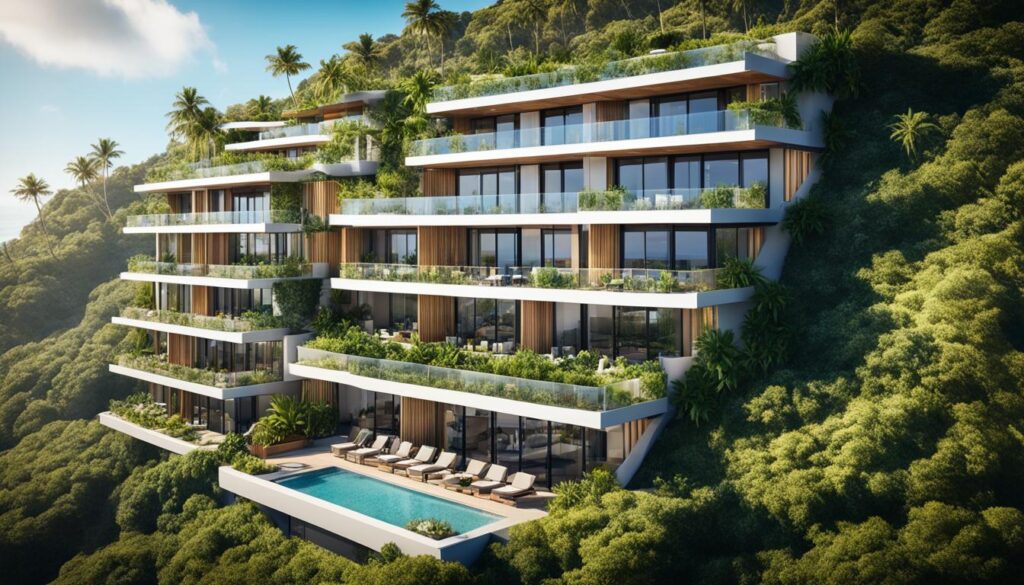
The Impact of Modular Construction in Hotel Development
Modular construction has revolutionized hotel development, offering numerous advantages to hoteliers in terms of speed, cost efficiency, and quality control. By leveraging the benefits of modular construction, hotel owners can meet tight schedules and open their establishments in time for peak tourist seasons, maximizing revenue potential.
One of the key advantages of modular construction is its cost efficiency. With predictable budgeting and reduced construction time, hoteliers can achieve faster returns on investment. The controlled factory environment ensures consistent quality, minimizing the risk of defects and costly rework. This streamlined approach to construction allows hoteliers to optimize their resources and allocate funds to other aspects of the hotel development process.
Modular construction also enables hotel owners to have design flexibility, catering to different types of hotel properties and meeting specific market demands. The scalability of modular construction allows for easy expansion, accommodating the growing needs of the hotel business. With modular construction, hoteliers can create customized and unique experiences for their guests, enhancing customer satisfaction and loyalty.
In addition to its impact on hotel development, modular construction also contributes to sustainability efforts. The controlled factory environment minimizes waste and ensures efficient resource utilization. Modular construction techniques also promote energy-efficient designs, aligning with the industry’s increasing focus on environmentally friendly practices.
Modular construction has become a game-changer in the hotel industry. Its speed, cost efficiency, and quality control are unmatched. We have witnessed a significant reduction in project timelines and a boost in profitability. The ability to customize and scale our properties easily has allowed us to stay ahead of market demands.
Case Study: XYZ Hotels
XYZ Hotels, a renowned hospitality brand, has successfully implemented modular construction in their hotel development projects. By embracing this innovative construction method, XYZ Hotels has achieved remarkable results in terms of speed, cost savings, and quality control. The implementation of modular construction has allowed XYZ Hotels to surpass their competitors in delivering projects on time and within budget.
With their modular construction strategy, XYZ Hotels has reduced construction timelines by up to 50%, enabling them to swiftly respond to market demands and capitalize on peak travel seasons. The cost efficiencies gained from modular construction have positively impacted the company’s bottom line, allowing for higher profitability and faster return on investment.
Moreover, XYZ Hotels emphasizes the importance of quality control in the modular construction process. By having a controlled factory environment, XYZ Hotels ensures that each modular component meets the highest standards of craftsmanship and durability. This commitment to quality has translated into happy guests and enhanced brand reputation.
XYZ Hotels also takes pride in their sustainable approach to hotel development. With modular construction, they have significantly reduced onsite waste and implemented energy-efficient designs. This commitment to sustainability resonates with their environmentally conscious guests who prioritize eco-friendly accommodations.
Overall, the impact of modular construction in hotel development is undeniable. It provides hoteliers with the speed, cost efficiency, and quality control necessary for successful projects. By adopting modular construction techniques, hotels can thrive in a competitive market, deliver exceptional guest experiences, and contribute to a more sustainable future.
Conclusion
Modular construction is shaping the future of the hospitality industry, offering a myriad of benefits and driving innovation. With its focus on speed, cost efficiency, quality control, and sustainability, modular construction is revolutionizing hotel development. This method provides hoteliers with customizable and scalable solutions, allowing them to create unique experiences for their guests.
One of the primary advantages of modular construction is its ability to significantly reduce construction time. By building hotel modules off-site in a controlled factory environment, hoteliers can open their establishments sooner and capitalize on peak booking periods. This not only maximizes revenue potential but also allows for faster responses to market demands.
In addition to time savings, modular construction also offers cost efficiency and budget predictability. With standardized processes and materials, hoteliers can better manage and control construction costs. The off-site construction also minimizes on-site disruption, avoiding potential delays and additional expenses.
Moreover, modular construction ensures consistent quality and adherence to standards. Factory-controlled processes ensure that each module meets the highest levels of craftsmanship and material quality. This results in hotels with superior finishes and better durability, enhancing the overall guest experience. Furthermore, the modular construction approach promotes sustainability by reducing waste, incorporating energy-efficient designs, and enabling recycling of materials.
FAQ
What is modular construction?
What are the advantages of modular construction in the hospitality industry?
How does modular construction reduce construction time?
How can modular construction save costs?
How does modular construction ensure consistent quality?
Can modular construction accommodate customization and easy expansion?
Is modular construction a sustainable option?
What are modular hotel units?
What advantages do modular hotel units offer?
How does modular construction impact hotel development?
What is the future of modular construction in the hospitality industry?
Source Links
- https://www.bdcnetwork.com/development-startup-brings-modular-solution-hospitality-industry
- https://www.contractormag.com/technology/article/21258861/modular-construction-and-the-future-of-building
- https://www.linkedin.com/pulse/from-factory-guest-rise-modular-hotels-motels-northgate-industries-a9gzc




